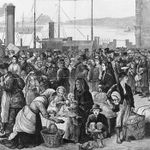94: How the seven-day week made us who we are
As a kid growing up in New York City, Roqua Montez was interested in everything — comics, dinosaurs, science, music and dance, martial arts — and his calendar filled up fast. Now, as the executive director of communications and media relations in UC Berkeley's Office of Communications and Public Affairs, he still has a lot to keep track of. To manage his activities and responsibilities, Roqua has relied on something that we all rely on: the seven-day week.
The week has been used as a timekeeping unit and calendar device to organize society for about 2,000 years, says David Henkin, a professor of history at Berkeley and author of the 2021 book, The Week: A History of the Unnatural Rhythms that Made Us Who We Are. But it's only for the past 200 years in America that the week has had a grip on our daily lives.
Listen to the episode, read a transcript and see photos on Berkeley News.
If you haven't already, follow Berkeley Voices and review us on Apple Podcasts and Spotify!
(UC Berkeley illustration by Neil Freese and music by Blue Dot Sessions)
Hosted on Acast. See acast.com/privacy for more information.









